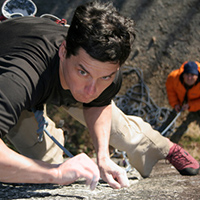Athletes regularly face win-lose situations, but so do business leaders, soldiers, litigators and even people making critical decisions about their lives. Many of us crumble under extreme pressure. But a few not only succeed, they thrive.
These people are "clutch performers."
Clutch performers learn and practice the necessary skills by being focused and disciplined. They train themselves to react in high-stress environments as they would in ordinary situations.
For example, being a clutch performer in a personal financial crisis means embracing thriftiness to keep yourself out of such crises in the first place. If that fails, you need to dispassionately sell off assets to keep from losing everything. People should live within their means, but they should also plan for the possibility that the present will not continue. Do this and you may avoid being in a pressure situation where you will have to make clutch decisions. In other words, if the ship starts to take on water, don't wait for it to start sinking before jumping off.
Here is a sports story on how to improve your skills to become a clutch golfer that illustrates five traits that may apply to your professional or personal life challenges.
If the best golfers in the world succumb to pressure, is there any hope for a recreational player? There is, but not through the ways people have typically tried to get better.
The lessons here apply to all people who play sports and find themselves frustrated by how they perform under pressure. The reason is that too much emphasis has traditionally been placed on the wrong things, from quick fixes to the thoughts running through someone's head.
Negative ones cause choking, the thinking goes, positive ones don't. This belief is misleading and could result in more frustration. Frustration under pressure is a result of too much emphasis on the mental game and not enough on perfecting the skills that would naturally make someone mentally tougher.
Making a player's game complete so s/he had no weaknesses under pressure is the goal.
The player can still hit bad shots or get lucky or unlucky, but when s/he stands over the ball, s/he must feel confident in hitting whatever shot was required.
To get to this end, simplify everything. Then measure the results so you could quantify what this player needs to do work on.
There are five areas to emphasise:
1. Technique,
2. Physical conditioning,
3. Simulated pressure,
4. An unwavering routine, and
5. Success on-the-road.
Working on these areas will help every golfer get better under pressure, but they will also help any person who plays a recreational sport that involves pitting herself against another player or a challenging terrain.
1. Technique: If a player was not technically sound, her swing would break down under pressure. Make the golf swing simple and effective and repeatable, with no compensations. When there is no compensation, there is less going on in the swing, and the swing holds up under pressure. That technical soundness extended from the full swing to short shots around the green to putting. The goal is to have no weak area, so a player could always hit a shot with the feeling that she would strike it well.
2. Physical Conditioning: Golfers need to be both strong and flexible to swing a club the right way. But they also have to be able to bear up to the physical strain of walking 10 kilometres a day in the hot sun for upwards of five hours. If you run out of steam on the fifteenth hole, no theories or tips are going help you win.
3. Simulated Pressure: Experience by simulating pressure in every aspect of the game is akin to what kids do in their backyard---if I chip the ball into the can, Sally will kiss me. Instead of hitting a particular shot twenty times, force yourself to hit it right the first time or not at all. Emphasise quality over quantity. The belief is that if enough pressure can be put on hitting a single shot to wherever you want it to go, then this will mirror the external pressure that comes from leading a tournament.
4. Unwavering Routine: At the crossroads of all this is a routine that is built into practice. This is what allows players to move their game from the driving range to the course. There is no set plan - other than the routine has to be repeated before every shot, from driving range to golf course, from tee to green.
5. Success on-the-Road: Many amateur golfers shoot low scores on the course they play every day but find themselves flailing on new courses or under conditions that are less familiar. The main reason is that their game has not been truly tested and is not as complete as they thought. They had been able to rely on their knowledge of every bend and rise in their home course to compensate for weaknesses in their game. On a new unfamiliar course, your weaknesses get magnified. Therefore, you must get yourself conditioned to a one-putt, one-shot mentality.



























